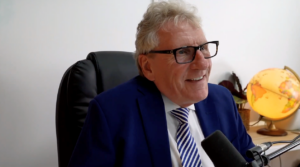A few weeks ago, I put up a picture of my old scaffolder’s card on LinkedIn. The post got a huge response, with so many people sharing their own memories about starting out in the industry – I was surprised and humbled that so many people found it interesting and took the time to say that my journey was inspiring to them.
Several people asked about my route from working on the tools to running a business. Of course, like all careers, it’s not a direct route, and I’ve had to learn a lot along the way. I decided to make the change after having worked a very highly paid scaffolding role on the Thames Barrier. I liked the money, and I realised that if I wanted to have a good standard of living, I needed to start again and re-train so I could get management roles. So I went for a supervisor role – at a third of the salary that I had been earning. But it was a step in the right direction and helped me to get the management roles I was looking for.
All these years later, I’m still learning now and I still don’t get everything right – but I thought it might be interesting and useful to share some of my habits and ways of working – plus things that I’m still learning because I’ve still got many years of work ahead of me yet!
Having been in a number of leadership roles and now as CEO of TRAD Group, I apply a mixture of organisation and flexibility to the way I do things. Organisation to make sure that my days are manageable and that I can meet my commitments – and make sure everyone else meets theirs, and flexibility to give people the freedom to make their own decisions, manage their own roles and contribute to the company’s/group’s success.
Managing expectations
I have high expectations of myself. I set long, medium and short-term goals for the business and for myself – and I review them every month to measure progress and to see what needs to be changed or where new things needed to be added. This helps me to organise and plan, and also gives me a framework that both I and others within the business can refer to.
And I do what I say. If I have committed to doing something I will do it, and I’ll do it on time. I hope for the same commitment from the people who work with me – not that they have to drop everything whenever I ask them. Instead, because I know they are busy, we agree a timescale and a date I can have it so that they have time to fit the task in. I absolutely expect it to be done by that date, though! And I note the commitment down and always ask for it on that day, without fail, to make sure I get it.
And that commitment applies to meetings too – I don’t take long meeting notes and I don’t believe in taking lots of minutes. I focus on a single A4 sheet with actions, responsibilities and completion dates. And then make sure I follow them up.
Similarly, in order to make sure that I get through my own task list – which is prioritised every day into morning and afternoon tasks – I want and expect people to get back to me when I send an email, text, or leave a phone message – as I know they will expect of me. If I don’t hear back, I call or email again in 24 hours, and then every 24 hours until I get a reply. And when I’ve made a request, I don’t cross that thing off my list, because it’s only half-done. Instead, it stays there until the task is completed. So, I’m always aware of what needs to be done, what’s outstanding and what’s completed.
This emphasis on expectations means that some people think I can be ruthless. But I’m not. A CEO has significant responsibilities – to their employees, to their shareholders or owners and to their other stakeholders. I need to balance those responsibilities equally all the time. Sometimes I have to make difficult decisions in one area to support another. And I believe with getting on with that – even when those decisions are very tough to make – so that everyone knows where they stand as soon as possible. If you hesitate, everyone potentially suffers equally.
Being involved
Whatever your position in a business, it’s absolutely essential to listen to others and communicate clearly. That’s even more important when you are running a business – if you stop talking to and listening to the people in your business, you’ll lose sight of why the business matters. So you should always spend time talking to the people you work with at all levels throughout the business, and to your clients too – they will all have useful perspectives and you will always learn something.
I think a good leader makes sure they are available. I keep a minimum of 25% of every day free, so that I am available for customers, staff or any unexpected events. I don’t want to be ‘too busy’ to respond to general questions or be around when people need me. If a member of staff can’t see me when they want to, they might not come back, and I will miss out on a valuable conversation and potentially an opportunity to help them.
I also like to make sure I haven’t missed anything important. That’s why, at the end of every day, I close my eyes, visualise every room and place I’ve been to, who I’ve spoken to and what I said and they said to me. Also, what they said they will do, and what I have committed to myself. I take some time to go through every meeting, call and conversation I’ve had during the day. I write down notes from the day, the commitments I’ve made and those made by others. I still have a Filofax as well as a laptop, iPad and iPhone, but the Filofax works for me and always has. One of my recommendations would be to always take notes – either on paper, your phone or a tablet – so that you can track conversations, commitments and decisions.
When I’m doing this exercise, I also take a moment to reflect on the language or demeanour of people I’ve seen during the day – did they understand my request? Were they confused, angry, frustrated, glad? Is there anything that I should have noticed and should check up on the following day? If there is, sometimes a brief telephone call can make all the difference to them.
Employee wellbeing is critical to business success – but it’s about more than that, it’s about your business being a family, and everyone in that family being looked after. If I ever ask someone to do something and they don’t understand why, I will take the time to explain the request or the decision. I always say to the other directors and managers in the business that it’s vital that people understand the basis of your decision making – even if they don’t agree with it.
Be prepared to change
Never be afraid to change course. It’s important to know when things are not working, and be prepared to alter the way you do things. Learn from your mistakes and don’t repeat them – analyse what may have gone wrong and why – talk to other people and work out how to do things better next time.
And one of my best pieces of advice is to accept the fact that you don’t know everything and you don’t have all the skills. Employ and engage people who have the skills you don’t have and let them get on with it. Don’t see them as a threat, because they’re not – they’re part of building a strong, adaptable business.
Part of this is making sure you have a good training platform for people to thrive and develop – you will be able to support people to find and develop the talents you need to keep building your business. if you don’t do this, they will leave and some other organisation will benefit from all the skills they have. The more skilled and committed people you have in your business, the more successful you – and they – will be.
A good leader is always learning – always looking for ways for themselves and the business to improve. Don’t surround yourself with ‘yes’ people – I have deliberately stayed away from this, even though it’s tempting! Instead, I encourage people to give me their opinions and I enjoy working with people who don’t wait to be asked. In fact, one of the great things about encouraging more diversity in the business – particularly bringing more women into both office and depot positions – is that I get a wide range of thoughts and opinions, which I always take on board. I have the same attitude – I will challenge a Group decision respectfully if I think it’s necessary. We shouldn’t be afraid to say what we think. And of course, I will always support the final decision – it’s important that we stand united as a team.
I’m always thinking about how I can act differently, think differently and stay different. As Steve Jobs said:
“Some people say give the customers what they want, but that’s not my approach. Our job is to figure out what they’re going to want before they do … People don’t know what they want until you show it to them. That’s why I never rely on market research. Our task is to read things that are not yet on the page.”
That’s what I try to do for our clients and for our staff. Adding that extra percentage to the service or offer you give means you can give your business an edge.
Final thoughts
Always make your plans with the goal of your company being the best it can be – not you being successful, but your company doing well – and doing well in the eyes of your competitors and the wider industry. When you focus on your business, you are making a difference to everyone who works there – when you work just for your own success, you forget the other people you have responsibility for.
I try to be humble – one of mine, and one of Altrad Group’s core values. A business succeeds because of all its people, not because of who just happens to have the MD or CEO initials. Treat people as you want to be treated, don’t take your bad moods or frustration out on others and keep a calm and open perspective – if you are obviously angry, for example, or finding things difficult, it will definitely have a knock-on effect on staff morale.
It’s important to recognise that everyone is an individual with their own talents, comfort zones and ways of doing things. Give them the flexibility to demonstrate their own entrepreneurial spirit – they will bring new ideas and innovations to the business that will help it succeed – and most importantly, be their own person.
Of course, there’s much more to say – and many more stories to share. I hope some of these thoughts help people who are either already moving up the career ladder or are thinking about taking the next step – in any industry, not just scaffolding or construction. You will make your own way, of course, but if anything I’ve said here has resonated with you, then I’m happy to have shared it with you.





